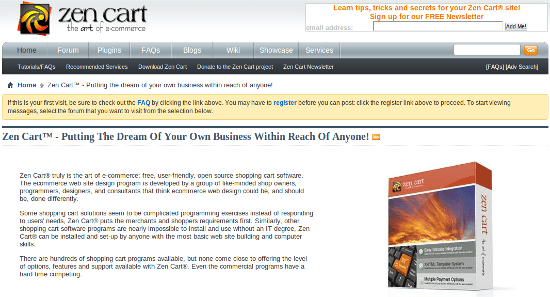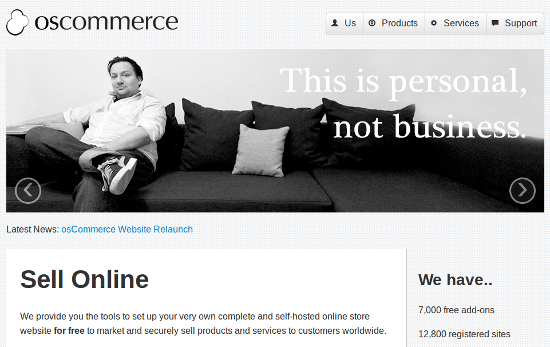Picking The Ideal Open Source eCommerce Option: 5 Major Players Overview
With the number of active users on the internet ever on the rise, more and more people are turning towards online shopping as compared to regular market shopping. As a result, several e-stores are coming up, including ones that function entirely as a web-based eCommerce store, or others that have both physical outlets and eCommerce solutions. If you are planning to start your own eCommerce website, or intend to sell your products and services online via your site in an easy manner, you have come to the right place. In this article, I shall be evaluating the pros and cons of some of the most popular and well-known open source eCommerce Content Management Systems and solutions.
 Image by PublicDomainPictures from Pixabay
Even though the number of free and open source solutions for eCommerce websites is quite high, we shall restrict our discussion to some of the most popular ones, namely, Zen Cart, Magento, osCommerce, OpenCart and PrestaShop. So without further ado, let us get started with the first option on our list!
Image by PublicDomainPictures from Pixabay
Even though the number of free and open source solutions for eCommerce websites is quite high, we shall restrict our discussion to some of the most popular ones, namely, Zen Cart, Magento, osCommerce, OpenCart and PrestaShop. So without further ado, let us get started with the first option on our list!





 Image by PublicDomainPictures from Pixabay
Even though the number of free and open source solutions for eCommerce websites is quite high, we shall restrict our discussion to some of the most popular ones, namely, Zen Cart, Magento, osCommerce, OpenCart and PrestaShop. So without further ado, let us get started with the first option on our list!
Image by PublicDomainPictures from Pixabay
Even though the number of free and open source solutions for eCommerce websites is quite high, we shall restrict our discussion to some of the most popular ones, namely, Zen Cart, Magento, osCommerce, OpenCart and PrestaShop. So without further ado, let us get started with the first option on our list!
Picking The Ideal Open Source eCommerce Option
1. Zen Cart
Zen Cart is a highly customizable eCommerce solution which is generally aiming at advanced users. It offers several marketing tools and customer management features, such as coupon codes, promotional offers, email order confirmation, gift certificates, and so on. Managing a website using Zen Cart can be a complex business. Considering the fact that the software itself is geared more towards the advanced user base, a novice will not find it easy to accomplish even some of the most basic tasks, such as updating the installation, editing or removing templates, and so on.
Verdict
Zen Cart is a good software -- that is if you are an expert with it. All said and done, it seems to be losing out to other solutions (such as PrestaShop) in terms of usability. Also, even though the software itself is free and open source, unless you yourself are an expert with Zen Cart, you will probably need to hire someone who knows his or her way around with this eCommerce solution. Thus, you should consider Zen Cart only if you can hire a Zen Cart professional, or you yourself have the required skills for creating a template, managing the CMS, etc. Otherwise, you will probably be better off with some other solution.2. Magento (Community Edition)
Magento is one of the world’s most popular eCommerce solutions, with over 150,000 websites running it. It offers support for mobile eCommerce, and comes in various versions, including a hosted solution and an enterprise version. However, since our focus is on free and open source solutions, we shall limit ourselves to Magento Community Edition, which is an open source software. While the Community Edition is available as a free download, unlike the Enterprise version, it does not have premium support to back it up. At best, the only support that you have access to includes the community forums. All said and done, using Magento Community Edition, even without support, means that you are employing the code base of one of the world’s most reputed eCommerce solutions, and this in itself is a good decision.
Verdict
Magento Community Edition offers you unlimited control over almost every aspect of your online store. If you are looking for a solution that offers just the right balance between scalability and ease of use, Magento might just do the trick for you! Also, you should surely consider Magento if you are managing multiple stores from a single interface and/or database. There is a good collection of ready-made templates which you can employ to customize your own online store. However, if you intend to tweak the appearance of your store, you may require advanced skills. Thus, even though Magento is a user-friendly software, setting it up and managing it at a level which is higher than just basic will probably mean you will either need to hire an expert or become an expert yourself.3. osCommerce
osCommerce is a veteran when it comes to eCommerce tools and solutions, for this German product has been around for almost 12 years now. osCommerce is a modular system that can be enhanced out of the box via add ons. Speaking of add ons, the repository boasts of over 7000 add ons. Furthermore, osCommerce powers 12,800+ websites and has 273,710+ community members. Naturally, with experience, osCommerce also has the numbers’ game on its side.
Verdict
osCommerce has had its share of security issues, such as this major attack in 2011. Of course, malicious intent is something that you can have no control over, and even WordPress goes through the ordeal every now and then. That said, osCommerce, even though it has been around for over a decade and does not seem to be fading anytime soon, seems way too dated for mainstream usage. In my opinion, if you are setting up an online store, you should consider the newer and more power-packed alternatives, in lieu of osCommerce.4. OpenCart
OpenCart is a simple, relatively younger, and easy to use eCommerce platform. Generally speaking, OpenCart’s primary niche includes small to medium-sized online business ventures and stores. The repository contains well over 8000 addons and extensions, alongside thousands of eCommerce themes and templates. OpenCart also comes loaded with features such as multi-store capabilities, product reviews and ratings, PCI compliance, discount coupons, tax settings and invoicing tools.
Verdict
OpenCart is probably one of the most intuitive and easy to use eCommerce platforms out there. If you are looking for a no-nonsense solution, OpenCart is meant for you! On the downside, it is still a relatively newer product and thus the size of the user base and additional features such as documentation may not be as detailed or diverse as one would want it to be.5. PrestaShop
PrestaShop, the last eCommerce platform on our list, offers just the most essential and oft-used eCommerce features. Just like Magento and OpenCart, PrestaShop too lets you manage multiple stores via one admin panel. The software itself has been translated into 56 languages so far. Furthermore, PrestaShop offers features such as one-page checkouts, product reviews and ratings, analytics, catalog management, tax settings, and so on. It is over five years old and has a loyal community with over 500,000 registered members and detailed documentation.

OSCommerce and openCart are god awful programs. Avoid these two at all costs. Very troublesome to customize, and the features are just not there yet.
What is happening with Magento? It looks good but on the surface appears to have run out steam. Its community version hasn’t had a release in over a year.
Yes, the current version (1.7.0.2) was released over a year ago, but there is a 1.8 version in alpha that was available for download as of April of this year. Take a look at the Release Archive history at http://www.magentocommerce.com/download.
Hey guys,
As an OSCom user of about 5 years now and multiple developed sites, I can say OSC is not an easy platform, but very powerful. If you’re willing to get in-depth PHP, SQL programming, use it and you will be amazed at all the plugins and features. I would compare the difference between the other platforms as willing to get down and dirty with a 30yo car utilizing its simplcity, but ability to overperform, vs. getting a new car and settling for what rolls out showroom. It is VERY customizable, but requires good programming knowledge. It is in no way the kind of click-to-install and setup WordPress kind of knowledge.
The security issues were a big problem, but this is also due to the number of stores out there and webdevs and “selfdevs” failing to update security features.
Anyone interested in OSC should have a look at OSCMax, which is an opensource well put together version of various addons and pretty regularly updated.
Afaik, many of the newer ecom platforms are OSC in their core anyways.
Cheers and good luck with your ecom dev endevours!
I have experience with all above applications. There was time for oscommerce and zencart. That time has passed. Trend suggests that as well.
Magento is a choice for companies with large budget. I call it good monster.
Prestashop is good cart but with messy code and UI.
I say yes to Opencart for small merchants, but it is very simple when it comes to features.
My favorite nowadays is a Abantecart. It stays in between. Great code, good UI, many features and yet easy to use.
Zencart was originally based on osCommerce 2.x code with enhancements added by a group of osCommerce third-party developers who formed the Zencart team. As is Magento, Zencart and osCommerce are programmed using the PHP language. However, osCommerce was originally developed using PHP version 3.x and later updated to PHP 4.x. Zencart and osCommerce 2.x were developed using what is known as procedural code largely because object- oriented programming did not truly exist until PHP 5.x was released. Zend, the developer of PHP also developed the Zend Framework. Magento was developed using PhP 5.x and the Zend Framework using moderm object oriented principles. Although osCommerce 3.x uses more object oriented classes and its own framework, it never seemed to recover from its procedural code past. I have not used Zencart in several years, but it’s decrease in popularity may have resulted from a similar mindset.
i’m not familiar with OpenCart or PrestaCart so I cannot comment on those. If OpenCart and PrestaCart are based on object-oriented frameworks of their own or third party object-oriented frameworks, that programming paradigm offers the potential for more modular (expandible and adapable) code execution and faster code execution.
The key to getting any e-commerce application to execute as quickly as possible is learn as much as you can about data, file, and object caching. These are caching software programs running under the PHP interpreter to increase the speed of applications by reusing frequently used data, files, and programming objects. Some hosts offer support for one or more caching schemes, some do not offer caching support at all. The databases used to store your product data need to be optimized for the number of records stored in the data tables. As sites grow in popularity and more product records are added, good database management is essential.
You can start off small with simple application requiring little programming skill or other intricacies of e- commerce site management, but if your site becomes successful, you either need to educate yoursel or hire professional help.